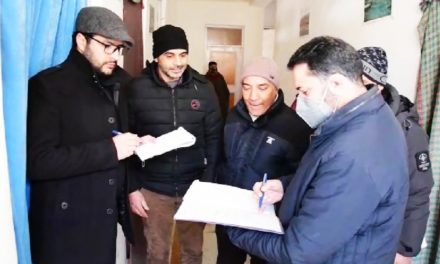![]()
KNZ NEWS DESK
Srinagar, Dec 31 : Cold conditions prevailed across J&K and Ladakh even there was slight rise in minimum temperature with Gulmarg recording a low of minus 9.0°C.
An official of the meteorological department told GNS that Srinagar, the summer capital of J&K, recorded a low of minus 3.0°C against previous night’s minus 4.0°C. Although the temperature was above 1.0°C than the previous night, it was minus 0.9°C below normal for this time of the year.
Kashmir is presently under the grip of 40-day long harshest period of winter, known locally as ‘Chillai Kalan, which started from December 21. It is followed by a 20-day long ‘Chillai Khurd’ and a 10-day-long ‘Chilla Bachha’.
The mercury settled at the world famous resort of Gulmarg at minus 9.0°C against minus 9.6°C on the previous night, he said.
Qazigund, the gateway town of Kashmir, had a low of minus 3.0°C against 4.2°C on the previous night, he said.
Pahalgam, the famous resort in south Kashmir, recorded a low of minus 6.6°C against minus 8.9°C on previous night, he said.
Kokernag, also in south Kashmir, recorded a low of minus 3.3°C against minus 3.6°C on previous night, the official said.
Kupwara town in north Kashmir recorded a minimum of minus 2.6°C against minus 4.4°C on the previous night, the official said.
Jammu, the J&K’s winter capital, saw a drop temperature by 8 notches from the precious night, recording a low of 5.1°C which is minus 1.5°C below normal for the place during this time of the year, he said.
Ladakh’s Leh had a low of minus 15.0°C against last night’s minus 16.0°C while automatic Kargil station recorded a minimum of minus 10.2°C. Drass in Kargil, the second coldest place in the world after Siberia, recorded a low of minus 19.8°C, the official said.
Weatherman has forecast widespread snow and rain spell of “moderate intensity” from January 4 to 6 in J&K and Ladakh.
“Widespread snow/rain spell of moderate intensity is most likely during 4-6th January in both J&k and Ladakh,” the official said. He said fall in minimum temperature is expected till January 2. (GNS)
























